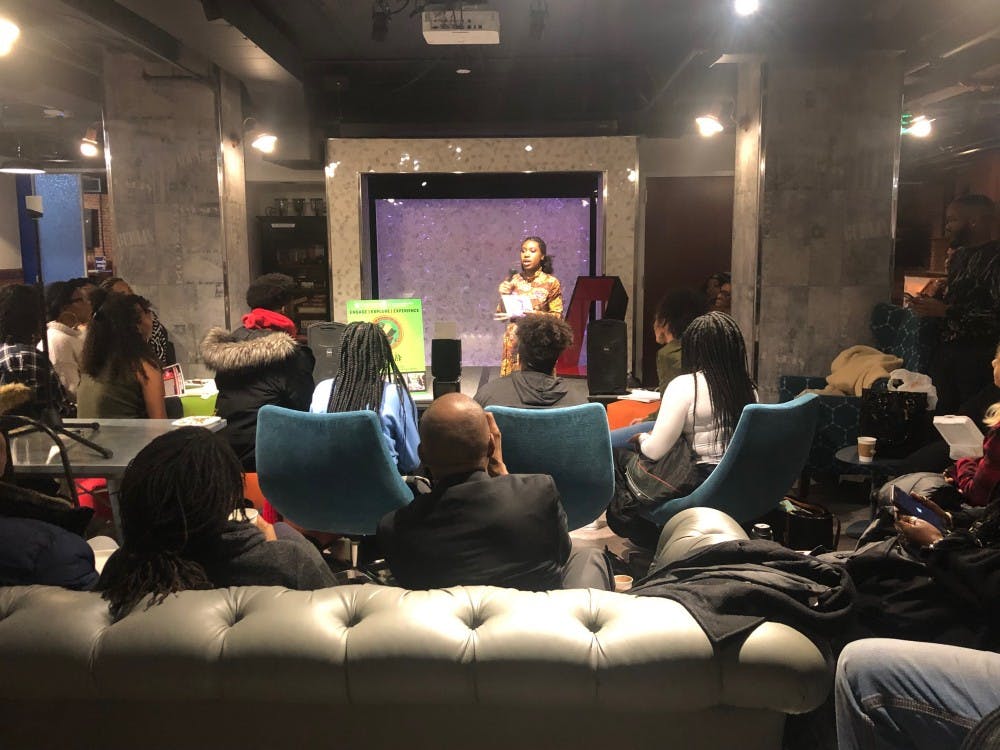In honor of Black History Month, the Office of Multicultural Affairs (OMA) hosted an opening ceremony at The LaB on Feb. 1. The ceremony featured poets Aja Monet, Dominique Christina and Mecca Verdell as the opening act. This was the first in a series of events that will be held throughout Hopkins during the month of February.
The News-Letter spoke with several black students during and after the event about their experiences with Black History Month. Students also discussed how they feel about OMA’s new Heritage 365 initiative, which encourages cultural celebrations throughout the year rather than just during the month designated to them.
The theme for this year’s Black Heritage Celebration was centered around the term Ubuntu. The Shona term comes from South Africa and translates to “I am because you are.” The emcees of the opening ceremony explained that they decided to use this expression because it demonstrates that no matter where a person is from in the black diaspora, each of them are connected to one another throughout time and history.
Assistant Director for Programming at OMA Kwame Phillips addressed the role of black women both in this year’s celebration and in black history.
“We decided to choose poets that will speak to women’s empowerment and will speak to women’s contribution to black heritage — both past and present — and how black women, in particular, changed the world,” he said.
Vice President of the Black Student Union (BSU) and President of the Multicultural Leadership Council Kendall Free explained that BSU and OMA hosted a slam poetry event last year that seemed to move the audience. By kicking off Black History Month with poetry, she hoped to have a similar impact.
“At Hopkins, we are so surrounded by science and pre-meds that the majority of us don’t get to engage with the softer side of things and remember who came before us,” Free said. “It is amazing that we get to have experts that can remind us so eloquently.”
Verdell noted that in her poetry, she shared personal stories as well as narratives about black people around her. She believes that this can serve as another motive for using poetry to commemorate Black History Month.
“I describe my poetry as being a record of the times, and that’s what is mainly important to me,” Verdell said.
Free introduced a new OMA initiative, Heritage365, as a way to extend the cultural celebrations past the traditional duration of a month. In order to do this, Phillips explained that OMA has not only organized cultural programs for the month of February but has also taken on the task of providing year-long engagement for each heritage celebration.
“I only learned this a couple months ago, but Black History Month started out as Negro History week, way back then,” Free said. “We have seen exponential growth during the course of the past 60-70 years, in terms of how much black people are ready to celebrate [their] blackness. We decided that 28 days is not enough time to do everything that we want to put in.”
Verdell shared that she not only used this month to reflect on the history of her family but also as a chance to embrace her own culture.
“I am definitely 100 percent black now, but during February, I am 150 percent,” Verdell said.
Free believes that OMA’s events for Black Heritage Celebration have been successful because there is a very strong black student population. She believes that, especially with the last two years’ incoming classes, the sense of community among black students has grown stronger. Free, however, said that she would like for more people from different cultural groups to come to Black Heritage Celebration events.
“Even though the black community is pretty small, we are mighty. We want to share our experiences and engage with other people as well,” Free said.
Following the opening ceremony, The News-Letter spoke with Executive Board member and brother of the historically black fraternity Alpha Phi Alpha Cameron White and Avery Burrell, president of the Eruption Step Team, which emphasizes African-American and Black-American culture and history in its shows.
White believes that Heritage365 has allowed OMA to become more all-inclusive.
“This program, with Heritage365, is a more concise and more all-encompassing [way]... to do all of the same programs that [OMA] have always done,” White said.
Phillips agreed, stressing the importance of celebrating one’s heritage beyond Black History Month.
“Celebrating my heritage is something I do throughout the year. It is an opportunity to honor my ancestors who have contributed so much to society over the course of time,” he said.
Burrell commented that although she was not heavily involved in planning events for Black History Month, she enjoyed being able to express herself and connect with her culture by having the opportunity to perform on campus with a dance team that has cultural roots.
Burrell also said that, to her, an important aspect of Black History Month is taking ownership of history.
“A lot of North American history has been told by the colonizers and not by the people who have played essential parts in the creation and maintenance of this country, so having an opportunity to have our own voice and speak our own truth is very important,” Burrell said.
White explained that Black History Month is a celebration of the culture that he identifies with and a celebration of his family’s ancestry.
“To me, it’s an opportunity to purposefully think about where we are, how far we have come and what we can do,” White said.





